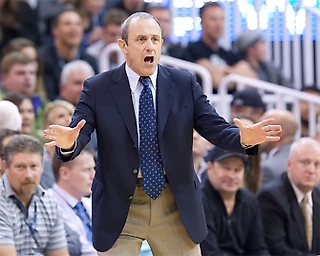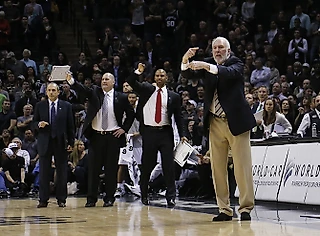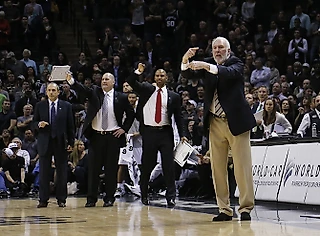Seven in a row
Most people thought we were going to win the quarterfinal series 3-0, which is what actually happened. But we remembered that we had had two very difficult games with Partizan in the regular season. We were lucky to escape with a win in Belgrade, as they missed their last 3 shots. Then we played a very poor game at home and lost.
The thing that worried me the most was their aggressive defense. Actually, they have two kinds of defense. The first one is using Vranes (2.29 m.) under the basket that makes difficult all the penetration. The second one is having both Lasme (second best in blocked shots in Top 16, although he’s only 2.04) and Velickovic on the court. This way they are much more aggressive and quick. So we had to make many adjustments. They also have very quick guards who can defend our shooters.
Another change they made since our last game in Moscow: Vesely became an established starter. With his long arms and his size, he could be a disturbing match-up for Ramunas. This is why the first decision we made was to play big.
In January, we played small most of the time and they were very effective inside. So we asked Ramunas to come off the bench. He even played a couple of Russian league games coming off the bench. I thought it would be good for us to have Victor Khryapa playing against Vesely. It would give us more rebounds thanks to Victor’s incredible athleticism and his understanding of the game. We decided to put J.R. with his quickness on Tripkovic who was their best shooter and who was extremely consistent throughout the Top 16.
It went like we hoped. The thing that surprised me the most was a pleasant one: we played the second game even better than the first one. In the first game, we were very nervous and shot poorly. I think we established the record by making only 2 three-pointers over 22 attempts. At the same time, both teams set a bunch of new records in defense. We gave up very few points. In the second game, instead of relaxing, we improved the quality of the game and got a 2-0 lead.
We expected an over-excited atmosphere in Belgrade and it really was. The arena was all black and white. I think we did the right thing going there and practicing in this arena one day before the game, something we never do. I usually prefer the team to practice in Moscow and then take a flight. I don’t like the idea of my team practicing after a long flight. But this time we thought we needed to take our time.
We also did a good job mentally as we were ready to stay there for four days and play two games. We weren’t too anxious to close the series in game three. We were ready for both options.
I returned Siskauskas to the starting five for one simple reason: they didn’t start Vesely. We were ready for the changes in their starting line-up. We told our players that if Vesely didn’t start, we would go with Ramunas. I wanted to have as many mismatches as possible. Ramunas would have the advantage of quickness and abilities in the match-up against their back-up small forward.
I was fortunate that I could give my five starters after Partizan’s. They were the home team and had to do it first. Both Ramunas and Victor were excellent as they made great adjustments to our needs at hand. Ramunas is a player who could score points easily. I wanted him to be fresh and I would have him against the right opponent to attack. It didn’t work well in game one. It was much better in the second game. When we extended the lead he was on the court and scored 6-8 points quickly. It also worked very well in game three. When Ramunas is on fire he’s like a scoring machine.
We managed to play a good game mentally, even though the crowd went wild in the second half and started throwing stuff on the court, to the point the commissioner considered suspending the game. We got the lead after two minutes and we were up for the rest of the game. It was a very physical game with much contact. Our veterans led the team. It was also great that, for example, a young player like Erazem stepped up and played a great series.
We defended, we rebounded (which was a problem for us this year, but playing big really helped), and we shared the ball on offense. If you can do these three things every time, you don’t depend too much on your shooting percentage. Actually, we won the series without shooting well from the three-point range. It was a good test for us before going to the Final Four.
Honestly, I think it’s a great accomplishment for our new team to make it to the Final Four again. This is CSKA’s seventh Final Four in a row and, personally, being part of it four years in a row is an incredible record. I don’t know whether it would be possible to beat this record. In the last decade only Maccabi (in 2005 and 2006), Kinder (in 1999 and 2002) and CSKA (in 2007 and 2009) went back to the Final Four after winning the title.
Two more spots in this Final Four are taken by the Greek teams: Panathinaikos from Athens and Olympiacos from Piraeus. Both had very impressive wins 3-1. It will be interesting for the fans to see their match-up in the semifinal.
Panathinaikos was astonishing in what they did. The truth is that over 160 minutes in 4 games, Siena was up for only 10 minutes. Everything fell down for Siena in game three. They were overwhelmed by the pressure. They seemed to overestimate their win on the road. They thought that they were closer to the Final Four than they really were.
When you play a team like Panathinaikos and you obtained the home court advantage, you have to play. Panathinaikos will never give up. I appreciate the word that Obradovic gave after game three. He said: “We played great, but, honestly, Siena missed many good shots”. That’s probably what happened. They were so tense, so uptight that they were shooting awfully. Panathinaikos totally deserved to win that game.
The fourth game was a typical playoff game. But something was going on in the mind of Siena players. You feel like you had a great chance and — bang! — you wasted it. Siena never built a lead. It reminds me what we said in the previous entry. You’re very good, if you improve your level in the second of back-to-back games. And this is what Panathinaikos did.
They weren’t satisfied with the recovered home court advantage. In Game 4 they played even tougher. I watched the game. Even when they were down, they were somehow playing their game forcing Siena out of its system, making them shoot more three-point shots and making them rush and make more turnovers then usual. In this series Panathinaikos played the game they wanted to play for three and a half games. They totally deserved their ticket to the Final Four. The same applies to Olympiacos.
Historically, a team winning the derby in the semifinal had a hard time in the final. It happened to my teams three times: twice to Kinder and one time to Benetton. In 1999, 2002, and 2003, we won the derby, but lost the title. Chances are high that the team that wins the derby would get exhausted. Especially, since Panathinaikos and Olympiacos will face each other in a month during which all Greece will talk about this semifinal. It will be like the game of the century. The pressure for both teams will be even higher (if that’s possible) compared to a usual Final Four.
As for the remaining spot, there were many ups and downs in the series between TAU and Barcelona. I’m not surprised because they are both excellent teams and totally capable of winning one game on the road. What amazes me is the point difference. TAU won by a big margin the first game and Barcelona won by a big margin the fourth one, although TAU was up early in the game and it looked like they were already going to the Final Four. I think game five that will be played on April 9 will be unpredictable. If I have to say something, I feel that when you come back like Barcelona did — after losing the first game at home, after feeling that everything is lost on the road, — you have a little bit more strength and confidence that might help you to qualify.
I don’t have a preference, because both teams are very strong and both teams might offer some very difficult match-ups for us. I know it’s going to be a very difficult semifinal. It’s already a great accomplishment that we are there.
It’s always difficult to judge which Final Four was tougher in terms of teams qualified, but for sure this year we’ll have one of best panel of teams that Euroleague has ever put together. It reminds me of the Final Four in Prague. There were 4 great teams: two-times champion Maccabi, Barcelona, TAU and us. We were an underdog, as we were without David Andersen and we had a new team.





Messina has surfaced in several recent searches, and it seems just a matter of time until he gets an NBA job. Messina replaced D’Antoni as the coach of Benetton Treviso»
http://sports.yahoo.com/nba/news;_ylt=AuU6IpeYsfZJIov4IIaQ0AW8vLYF?slug=aw-nbacoaches040909&prov=yhoo&type=lgns
If the above mentioned ever happend, welcome!!!!